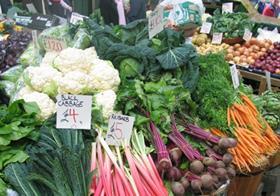
A new report from Peas Please, produced by the Food Foundation in partnership with Nourish Scotland, Food Sense Wales and Food NI, has highlighted that UK home-grown vegetable production fell by 12 per cent between 2017 and 2018, bringing domestic production levels to a 20-year low.
Figures from Veg Facts 2020: In Brief, showed that just 52.7 per cent of the vegetables consumed at home are grown in the UK, while new research from the SHEFS consortium found that the UK supply of fruit and vegetables had become increasingly reliant on imports, particularly from countries that are vulnerable to climate change and water scarcity.
Under lockdown in the UK, 25 per cent of households with children are ‘worried’ about getting enough fruit and veg for their children, and 6 per cent are ‘very worried’, with increasingly strained supply chains compromising access to affordable fruit and vegetables at home.
Veg Facts 2020 also demonstrated that pre-Covid-19, UK citizens were not eating enough fruit and vegetables to protect their health, with 11 per cent of adults and 33 per cent of 5-10-year-olds in the UK eating less than one portion of vegetables a day.
The Agriculture Bill underwent its second reading in the House of Lords yesterday, with the Food Foundation calling for the Bill to support human and planetary health by prioritising horticulture.
Diets that are low in vegetables are associated with almost 21,000 premature deaths in the UK every year, but each additional portion of veg consumed can reduce risk of mortality by 5 per cent.
“Now more than ever we must have an Agriculture Bill which supports public health as well as environmental benefit,' said
Anna Taylor, executive director of the Food Foundation. 'We need a national plan to get us all eating enough fruit and veg to protect our health and British horticulture could play an important part.”
Baroness Rosie Boycott added: “Our food system needs to be more resilient to both economic shocks and environmental and climate risks. It must be less dependent on last minute deliveries of vital perishable foods from overseas, and with a diversification of food retail options to form more resilient, vibrant local food economies.
'Our nation’s health also needs to be prioritised,' Boycitt added. 'Government should give businesses that are promoting healthy eating a head start, re-build our nation’s horticulture sector and put in place much more robust economic safety net so that everyone can afford a diet which protects their health.”



